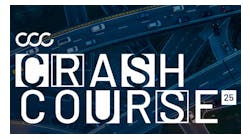Collision repairers in the Nutmeg State are spicing up an ongoing brouhaha with the insurance industry over alleged steering by filing a series of class action lawsuits against carriers viewed as the more egregious offenders. “It’s been killing us, and we’ve decided that we’ve had enough,” says Bob Skrip, president of the Auto Body Association of Connecticut (ABAC) and owner of Skrip’s Auto Body Inc. in Prospect. “We’ve worked 30 years to establish a customer base, and they’re trying to take our customers away.” Listing Skrip and several other shop owners as plaintiffs, the ABAC is suing Progressive and The Hartford over charges that the insurers are illegally steering policyholders toward the companies’ respective direct repair programs (DRPs). “We’re not against DRPs – we’re against the blatant disregard of the laws,” he says. Skrip recounts customers in his office being harangued via cell phone by insurance company representatives urging them to take their car elsewhere. Although Connecticut’s attorney general has been helpful in pushing enforcement, the ABAC sees a distinct lack of regulatory vigor within the Department of Insurance – making the court cases a necessity. Calling for class action status that would ultimately bring injunctive and financial redress to each of the non-DRP shops among the state’s 481 collision repair centers, the organization’s pending legal maneuvers versus Progressive and Hartford are just a portion of the strategies being implemented. “There are three more class actions to be brought against three more companies,” Skrip says. He declined to name the targeted carriers, but ABAC members have been busy compiling dossiers of alleged steering misdeeds in anticipation of the filings. The court-based battle plan is affordable for the association because it has retained lawyers willing to take the cases on a contingency basis; they’ll pursue the claims at no charge in exchange for a percentage of the settlement should they emerge victorious. The filing against Progressive is in the discovery stage, and the Connecticut Supreme Court unanimously upheld a lower court’s certification of class action status in the Hartford case. “All five justices sided with the automobile repair industry,” Skrip says. In its ruling, the Supreme Court paved the path toward a Superior Court trial scheduled to begin in December. “It greatly advances our ability to represent and vindicate the rights of these hard-working small business owners,” says lawyer David Slossberg, an ABAC co-counsel who argued the case before the Supreme Court. “We believe this is another step toward bringing a sense of order to the auto body industry in Connecticut in accordance with Connecticut statutes and regulations,” says lawyer Alan Neigher, another ABAC co-counsel. “This is just one more step in a long road against The Hartford and other insurance companies that seemingly disregard both regulations and consumers’ best interests,” says Skrip. “This is a very positive development for consumers and body shops statewide. It remains a long process but we are more confident than ever that the courts will rule in our favor.” “The Hartford is disappointed with the court’s ruling,” says company spokesman Thomas Hambrick. “We do not believe that class treatment is appropriate for this case, but we are eager to move ahead to the merits of the case. The Hartford believes its direct repair programs are fully consistent with Connecticut law and work to the benefit of The Hartford’s policyholders. We will continue to defend the case vigorously and are confident of prevailing on the merits.” Building a Case The ABAC, along with three Connecticut body shop owners, alleges that the insurance company “engaged in a pattern of unfair practices” in violation of state laws. Hartford is accused of steering its customers to its “preferred” DRP shops rather than freely allowing customers to use repairers of their own choosing.Also, according to suit, Hartford suppressed body shop labor rates by eliminating the use of independent appraisers and relying exclusively on its own automobile service representatives to perform appraisals so the company could control their content, including the amounts to be paid for labor. The filing says this tactic results in consumers not getting fair, independent appraisals of the damage done to their vehicles. “The Hartford reviews the appraisals to make sure they conform to company expectations,” says Skrip “The Hartford has characterized shops that charge more than its approved labor rate as ‘militant.’” The accusations against Hartford are supported in the lawsuit by extensive documentation, including internal documents detailing company policies as well as several depositions by company employees, he said. “For years, every body shop owner in Connecticut has been forced to fight against The Hartford and similar car insurance companies,” Skrip says. “Enough is enough. Consumers should remember that it’s your car. It’s your choice where it is repaired.” Evidence presented in the case charges that when customers required repairs, Hartford employees known as “customer care team specialists” were instructed to direct them to a preferred shop in the company’s “customer care repair service program.” Consumers were often pressured to abandon their choice in favor of a Hartford preferred shop, the suit argues. The specialists were trained to aggressively “sell” the company’s DRP by informing customers that if they used the recommended shop they would obtain discounts from their deductible and a lifetime guarantee for the repairs, the claim contends. “Any insurance company touting a lifetime guarantee is offering the same thing that every other independent body shop offers,” says Thomas Bivona, past president of the ABAC and owner of My Way Auto Body with locations in Stamford and Greenwich. The lawsuit, filed in 2003, was brought to the forefront during Bivona’s tenure. “The insurance companies clearly place considerable pressure on their specialists, with supervisors monitoring calls and coaching the specialists to break a consumer’s will to go to their own neighborhood repair shop,” Bivona says. “We found that The Hartford even offers cash bonuses and other incentives to specialists who direct customers to the preferred shops. Specialists could be disciplined for deficient performance,” he adds. “Insurance companies carjack consumers by steering them to repair shops the companies prefer – shops that may install aftermarket or used parts,” says Bivona. “Using these parts may void a new car warranty – something insurance companies neglect to tell consumers. Consumers don’t see that company-preferred shops may cut corners on repairs, perhaps using inferior parts.” Meanwhile, in May the state legislature approved a new law tightening existing consumer protections from insurance company steering. Attorney General Richard Blumenthal, along with a number of state senators and representatives, supported the measure aimed at deterring “collusive relationships between certain insurers and repairers.” “It requires every DRP shop to have a customer sign a notice that they are aware they can have the shop of their choice,” says Skrip. “It’s a little victory. It’s not as much as we wanted to see, but we’ll take what we can get.” The ABAC has embarked upon an initiative to provide post-repair inspections of vehicles, a process overseen by an independent third-party appraisal firm. Bodywork conducted with glue and cardboard has been uncovered on several cars. “We’ve seen numerous vehicles that are unsafe,” says Skrip. “It’s sickening; that’s what some of these direct repair shops have to do to stay profitable,” he observes. “The proof is in the pudding – you can see the terrible repairs.” For more information, visit www.abaconn.com. |




